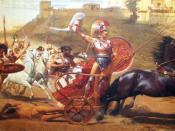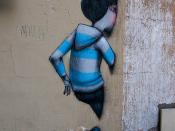Paris: Magnificent Hero or Spoiled Child? Homer uses tone, imagery, epithets, and similes to describe Paris' character. Outwardly, Paris is a brave person, but inwardly, he is full of doubts and fears. He is like a stallion that has been pampered too much, a child who is allowed to get everything he wants. Because of his attitude, he starts the Trojan War and brings on the fall of Troy.
Paris is portrayed in this passage as being a walking contradiction. He appears to be a hero, but is one of the causes of the war because he kidnapped Helen for his own selfish interests. Homer uses the contradictions in Paris' behavior to suggest the ironic contrasts in his character. For example, in line 40, after seeing his formidable opponent Atrides, he "dissolve[s] again in the proud Trojan lines, dreading Atrides-magnificent, brave Paris." At first glance, he appears very afraid, hardly the hero he is supposed to be.
He "dissolves," as Homer describes it, a verb choice which implies fragmentation of attitude or feeling. It is as if his famed hero's will were itself disintegrating on the battlefield. Homer uses the epithet "proud" to modify the Trojan lines, an adjective that intensifies the effect of Paris' action of retreating by mentioning its opposite. Homer further reviles Paris by calling him, ironically, "magnificent" and "brave," thereby heightening the indignity of his cowardly retreat.
Another contrast in Paris' character is represented in his beauty. He is known as one of the most handsome men in Troy, but looks can be deceiving, as Hector implies when he says, "Paris, appalling Paris! Our prince of beauty--/mad for women, you lure them all to ruin!" In this quote, Hector is highlighting Paris' ability to ruin virtually everyone's future. After all, Hector's comment suggests, he is...


